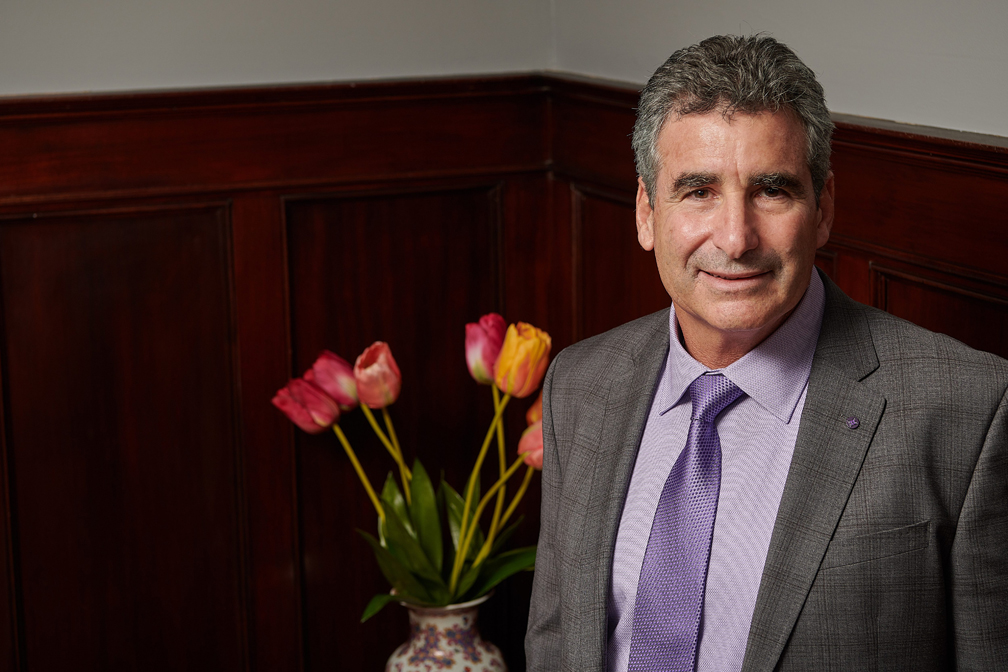University of Connecticut President Thomas C. Katsouleas had just come from his first in-person meeting with his leadership team at the Storrs campus since the COVID-19 pandemic forced the closing of the school facilities.
“It felt very good to be back in, though it”™s going to take some getting used to wearing the masks,” said Katsouleas in an upcoming video interview produced for the Westfair Communications YouTube channel.

Peter Morenus/UConn Photo
Katsouleas became UConn”™s 16th president last August, but since the pandemic began he found his routine altered into what he described as “emergency and crisis management on a pretty daily basis.” The impact has already affected him.
“It occurred to me that I kind of aged four months and then four years,” he said. “I don”™t feel like a first-year president anymore. I feel like a seasoned and tested veteran.”
Katsouleas reported that UConn will be keeping its original calendar of resuming classes on Aug. 31, but academic life will look very different.
“We will be bringing students back into the residence halls in a reduced density, beginning the middle of August,” he said. “We haven”™t worked out the details of this, but it”™s a phased-in return so that we can perform the testing of every student who”™s returning and every student-facing staff member as well.”
The fall semester will offer a mix of in-person and online education, but the school will go exclusively online after the Thanksgiving break. Katsouleas said sending students to travel home for the holiday and then having them return adds “considerably more risk to the strategy of keeping students and staff safe and healthy.” He added the online-exclusive time will only be limited to the “last two weeks of instruction and finals.”
Katsouleas expressed confidence that UConn”™s online education was equal in quality to classroom instructions.
“We were one of the earliest to give notice to our faculty to prepare for the eventuality of being online,” he said. “We gave our faculty two weeks”™ notice ”” with some of our peers, it was only two days. And at the time that we asked the faculty to begin preparing, it was really a hypothetical ”” no one really expected that we were going to be pulling the trigger on that.
“Fortunately,” he added, “we had a significant history of online instruction across all of our schools and departments ”” we had that expertise to draw upon, we knew a lot about synchronous and asynchronous pedagogies and which worked in different types of classes and different size classes.”
Katsouleas added that U.S. Sen. Chris Murphy asked him if “the experience of going online would represent a step towards the end of residential colleges.” Katsouleas told the senator it was just the opposite.
“What we”™ve heard from students is they got the knowledge that they needed to pass the course. But it”™s not what they were seeking from a residential college experience and they can”™t wait to get back. And we”™re seeing that in our fall applications, which are considerably up, and our messages from our parents and our students is: ”˜Are you going to be back in person? That”™s what I”™m looking for.”™”
Of course, one aspect of the UConn experience that cannot be transferred online is its nationally renown athletics program. Katsouleas stated the school is planning to bring its student athletes back to the campus in the early summer, with the goal of returning to play while keeping pandemic-abatement protocols in place.
“We don”™t know what fall sports will look like,” he said. “We do know we”™re working toward resuming them. And we”™re making pretty good progress. There are a couple of milestones we had to achieve before the football players could come back July 1, and we haven”™t checked off every box yet. But between now and July 1, I”™ looks like we will. They will get started and it won”™t look the same, but we”™ll just have to take it from there and see what happens.”
Katsouleas also observed the tumult created in the aftermath of the death of George Floyd while in Minneapolis police custody, noting that UConn is committed to reaffirming its commitment to diversity. The school hosted a virtual town hall conducted by its African American cultural center and attended by several hundred people to bring insight to questions of racial inequality and civil rights. He acknowledged that UConn needs to do a better job in being part of the solution to a more inclusive society.
“We also need to reflect on our own practices and address structural racism that exists in any predominantly white institution with a long history ”” and be introspective and reflective on what more we can do,” he said.
“I hope we can also provide leadership on a national level. We”™ve been talking with deans about developing additional degree programs for a master”™s in public safety that would train the next generation of police leaders in more advanced practices that are evidence-based and research-based, that are effective and not racist.
“The University of New Haven has a program in police and fire safety and there might be a possible partnership there,” he said. “And we”™re working with our legislative leaders about how we could partner on any particular legislation, or if our law school could help work with them to do something that would bring about more rapid change.”




















